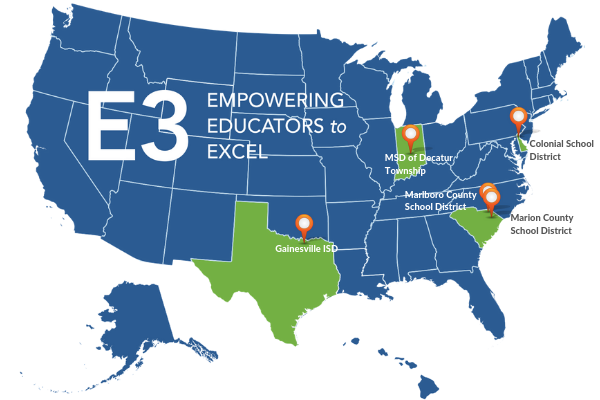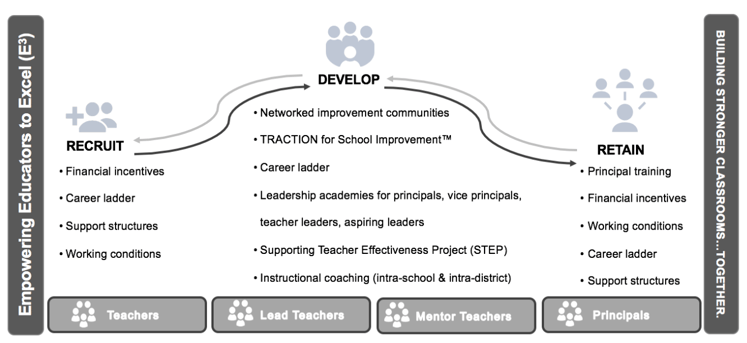
Insight is incredibly excited to announce a new partnership with five districts across four states funded by the Teacher and School Leader Incentive Program (TSL) Grant from the U.S. Department of Education.
One of 14 grants awarded, TSL funding will support Insight’s Empowering Educators to Excel (E3) program, a partnership which will provide 47 schools in Delaware, Indiana, South Carolina, and Texas the opportunity to work together in a networked improvement community (NIC) context.
Project Overview
E3 will focus on the greatest school-related influencers on student achievement: the recruitment, development, and retention of teachers, teacher leaders, and principals.
Insight will partner with and support the following districts:

- Colonial School District (New Castle, DE)
- Gainesville Independent School District (Gainesville, TX)
- Marion County School District (Marion, SC)
- Marlboro County School District (Marlboro, SC)
- Metropolitan School District of Decatur Township (Indianapolis, IN)
A large percentage of school districts across the U.S. are comprised of 15 or fewer schools and many of these school districts lack the resources and infrastructure of larger districts, but confront the same basic challenges.
E3 creates the best of both worlds: With a total student enrollment 28,196, E3 provides districts—many of whom are also rural—the advantages of larger districts with a larger community of educators and opportunities for professional development while at the same time allowing educators to maintain and grow their professional connections in their local communities.
Project Objectives & Components
Our theory of action is that all schools and participating districts are working to create or enhance the most impactful levers to improve both principal and teacher effectiveness—at the systems level with a constant focus on results.
E3's project objectives are purposefully transparent and aligned to the theory of action:
- improve student achievement;
- increase and support teacher and principal effectiveness; and
- evaluate the return on investment of every project activity versus student achievement.
E3’s approach is grounded in research and experience as well as systemic approaches from the macro to the micro level of instruction as displayed in the graphic below.

Rigorous academic standards, as well as the levers and wrap-around supports within the "develop" column above, are the core of each partner districts efforts to improve teaching by leveraging current human capital. The levers will include:
- networked improvement communities for school leadership teams and teachers to learn from one another by sharing resources as well as leveraging educators' expertise inside and among districts
- instructional leadership teams through TRACTION for School Improvement
- creating a career ladder continuum at E3 schools for teachers
- leadership academies for aspiring and current leaders
- PLCs using an evidence-based asset-based model, Supporting Teacher Effectiveness Project, that identifies bright spots to replicate in local schools and across NICs
- job-embedded individual and peer coaching in-person and by video using Insight's Coaching for Change model and a video-based observation and coaching platform
E3 prioritizes stakeholder engagement and local control. Each district partner will have a standing stakeholder group to decide the local, contextually specific items which are specific to each district (e.g. weights for overall educator effectiveness scores).
In addition, E3 will utilize a quarterly Advisory Council comprised of district-level leaders, principals, higher education partners, and teachers from E3 schools to serve as the governing body for TSL implementation across all partner districts.
Funded by the U.S. Department of Education’s Office of Innovation and Improvement, the TSL grant is a new discretionary grant program that builds on the former Teacher Incentive Fund program. TSL promotes the implementation of performance-based compensation and comprehensive human capital management systems for teachers, principals, and other school leaders.
Stay Tuned
The Insight team and I are thrilled to have the opportunity to lead and facilitate this important work. We look forward to regularly sharing with the field at large about the important lessons and best practices we learn as we implement E3.
Follow us on this journey via Facebook, Twitter, LinkedIn, Instagram and by subscribing to our News & Updates email list.
